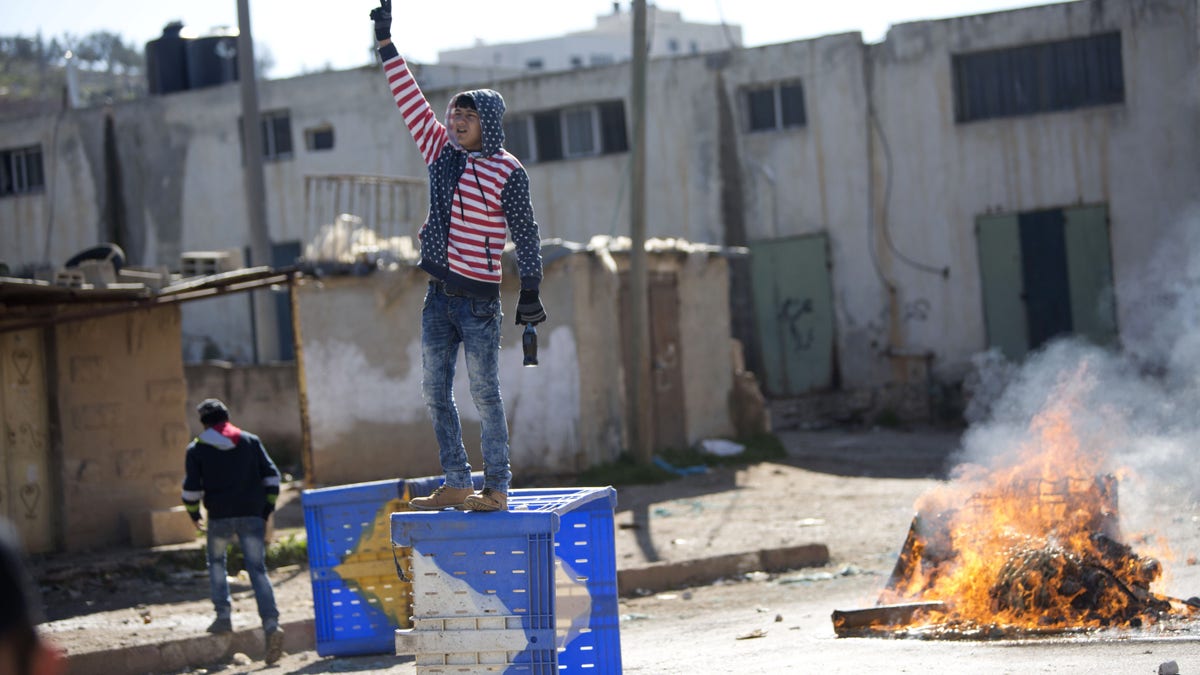
Israeli soldiers arrest a Palestinian protester during clashes in the West Bank village of Kabatiya Thursday. (AP Photo/Majdi Mohammed)
The Israeli military on Thursday sealed off the home village of the three Palestinian men who staged a deadly attack in Jerusalem and carried out a number of arrests there.
Citing "situation assessments," the military said no one can exit or enter the village of Kabatiya in the northern West Bank until further notice. Minor clashes broke out in the area between Israeli troops and rock-throwing Palestinian youth.

A Palestinian protester stands on top of a barricade during clashes with the Israeli military in the West Bank village of Kabatiya Thursday. (AP Photo/Majdi Mohammed)
Such internal closures were common during the second Palestinian uprising but have been rarely used in recent years.
Wednesday's attack with automatic weapons, knives and explosive devices killed a 19-year-old police officer and wounded another in one of the most brazen attacks of the current round of violence roiling the region. The three Palestinians, in their early 20s, were shot and killed by police.
"This is a prolonged battle. Islamic terror is sweeping across the whole world and inciting millions," said Prime Minister Benjamin Netanyahu during a visit to a Jerusalem hospital with troops wounded in the attacks. "We are in this turmoil. It doesn't skip us but we battle it fiercely and will continue to do so."
The nearly five-month long wave of Israeli-Palestinian violence has killed 27 Israelis and 154 Palestinians; of those Israel says 109 were attackers and the rest killed in clashes with security forces.
In the latest violence, police said two 13-year-old Arab girls stabbed and lightly wounded a security guard at a bus station in the mixed Jewish-Arab Israeli city of Ramle on Thursday. A photo from the scene shared by police showed two kitchen knives on the ground beside a calculator, pens and other school supplies. The girls, who are Israeli citizens, were arrested at the scene, police said.
Israel says the violence has been fueled by a Palestinian campaign of lies and incitement. The Palestinians say it is rooted in frustrations stemming from nearly 50 years of Israeli occupation.
Israel has deployed a series of measures in a bid to crack down on the violence, including sending troops to secure its cities, expanding police powers and toughening punishments for attackers.
Israel's Interior Minister Aryeh Deri said on Thursday he would not extend the residency rights of the father of an Arab citizen of Israel who carried out an attack in October, annuling his access to social security. Deri said the step was meant to "cause terrorists to understand that their actions will have tough implications also on their family members."
The Interior Ministry said its decision was also based on the father violating an agreement to not communicate with family members of his whom Israel says are militants.
Israel has previously revoked the residency rights of four Palestinian residents of Jerusalem who carried out attacks against Israelis.
